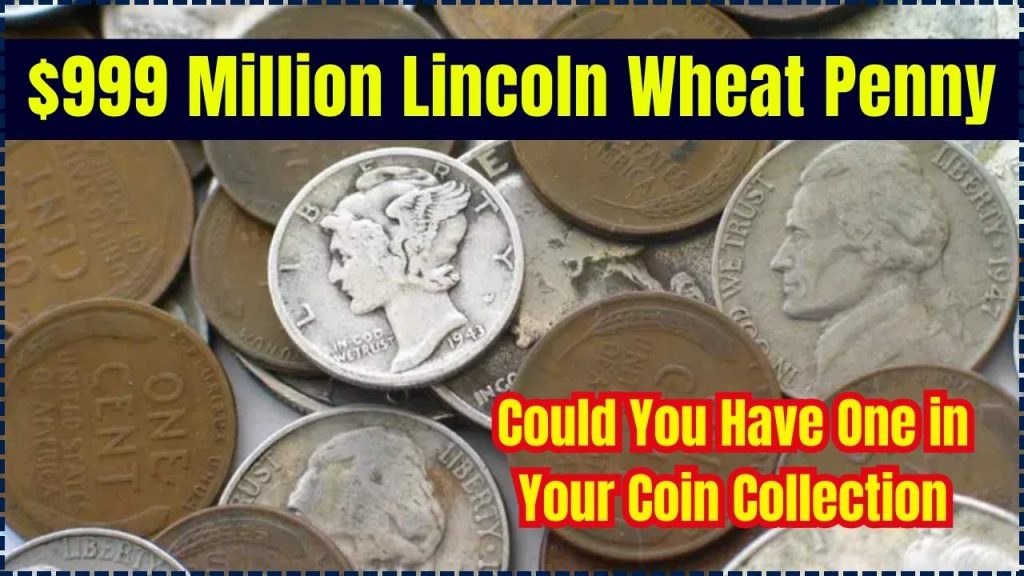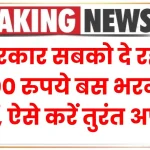
$999 Million Lincoln Wheat Penny: Have you ever checked your old coin jar and wondered if you might be holding a small fortune? Believe it or not, one rare Lincoln Wheat Penny has been valued at an astonishing $999 million! Yes, you read that right. This unassuming coin, often overlooked, could be hiding in plain sight in your collection.
In this article, we’ll explore what makes the Lincoln Wheat Penny so valuable, key varieties to look out for, and how you can check if you’re sitting on a goldmine. Whether you’re a beginner or a seasoned numismatist, this guide will offer insights into the fascinating world of coin collecting.
$999 Million Lincoln Wheat Penny
| Key Details | Information |
|---|---|
| Coin Name | Lincoln Wheat Penny |
| Year Range Minted | 1909 – 1958 |
| Potential Value | Up to $999 million (for rare varieties) |
| Most Valuable Varieties | 1909-S VDB, 1943 Copper Penny, 1955 Doubled Die Penny |
| Main Factors for High Value | Mint errors, low mintage numbers, specific mint marks, pristine condition |
| Official Coin Resource | U.S. Mint Official Website |
The story of the $999 Million Lincoln Wheat Penny is a testament to how something so small can hold immense historical and monetary value. Whether you’re casually checking your change or seriously collecting coins, knowing what to look for can pay off in a big way. Always handle your coins with care, consult professionals, and you might just find yourself holding a priceless piece of history.
What is a Lincoln Wheat Penny?
The Lincoln Wheat Penny, also known simply as the Wheat Cent, was introduced in 1909 to commemorate the 100th anniversary of Abraham Lincoln’s birth. It was the first U.S. coin to feature a real person, making it historically significant.
These pennies are easily recognizable by the portrait of Lincoln on the obverse (front) and the two wheat stalks on the reverse (back)—hence the name “Wheat Penny.”
While most Wheat Pennies are only worth a few cents over their face value, some rare varieties have sold for thousands or even millions of dollars at auctions.
Why Are Some Lincoln Wheat Pennies Worth Millions?
Several factors influence the value of a Lincoln Wheat Penny:
1. Mint Errors and Anomalies
Rare minting mistakes can make a penny incredibly valuable. For instance:
- 1943 Copper Penny: In 1943, pennies were supposed to be made from zinc-coated steel due to copper shortages during WWII. However, a few were mistakenly minted on copper planchets. Only a handful exist today, and these can fetch millions.
- 1955 Doubled Die Penny: This coin features a doubling of the date and lettering due to a die misalignment during production, making it a collector’s dream.
2. Low Mintage Numbers
Coins produced in limited numbers are more valuable. The 1909-S VDB penny, minted in San Francisco, had only 484,000 coins produced. Its rarity makes it highly sought after.
3. Mint Marks and Locations
Look for mint marks like “S” (San Francisco) or “D” (Denver) beneath the date on the obverse side. Specific combinations of year and mint mark command premium prices.
4. Condition (Grade)
The coin’s condition plays a crucial role. Coins graded as Mint State (MS-65 or higher) are worth exponentially more than those showing signs of wear.
How to Check if You Have a Valuable Lincoln Wheat Penny
Here’s a simple step-by-step guide:
Step 1: Inspect the Date and Mint Mark
Look closely at the year and mint mark. Key dates include:
- 1909-S VDB
- 1914-D
- 1922 (No D)
- 1931-S
- 1943 (Copper, not steel)
- 1955 Doubled Die
Step 2: Weigh the Coin
- Copper pennies: 3.11 grams
- Steel pennies: 2.70 grams
If your 1943 penny is copper and weighs 3.11 grams, you might have a jackpot.
Step 3: Magnet Test
Steel pennies are magnetic, copper ones are not. This is especially useful for identifying the rare 1943 Copper Penny.
Step 4: Examine Coin Condition
Coins in pristine, uncirculated condition are worth much more. Consider getting your coin graded by professionals like PCGS (Professional Coin Grading Service).
Step 5: Consult a Reputable Dealer
Always get an expert opinion before selling or buying. Trusted dealers can offer appraisals and authentication services.
Most Valuable Lincoln Wheat Pennies
| Year & Mint Mark | Notable Feature | Estimated Value (USD) |
| 1909-S VDB | Low mintage, designer initials VDB | $1,500 to $100,000+ |
| 1943 Copper (No mint mark) | Struck on copper planchet mistakenly | $100,000 to $1.7 million |
| 1955 Doubled Die | Doubling of date and lettering | $1,000 to $100,000+ |
| 1922 No D | Missing mint mark due to die wear | $500 to $50,000+ |
| 1931-S | Low mintage, only 866,000 minted | $100 to $10,000+ |
What Should You Do If You Find a Rare Penny?
- Do not clean the coin. Cleaning can reduce its value.
- Have it authenticated by PCGS or NGC.
- Get it appraised through a reputable dealer.
- Explore selling options such as auctions, coin shows, or trusted dealers.
Own a Kennedy Half-Dollar? It Could Be Worth $160,000! Check These 4 Rare Coins!
$450 Million For 3 Rare Dimes and Bicentennial Coins – Do You Own One?
FAQs About $999 Million Lincoln Wheat Penny
1. How can I tell if my Lincoln Wheat Penny is valuable?
Check the year, mint mark, and look for mint errors like doubling. Weigh the coin and test it with a magnet.
2. Are all 1943 pennies valuable?
No, most 1943 pennies are made of steel and are not particularly valuable. However, if you have a 1943 copper penny, it’s extremely rare and could be worth millions.
3. What is the best way to sell a valuable penny?
It’s best to sell through a reputable auction house or certified dealer to ensure authenticity and maximum return.
4. Where can I get my coin authenticated?
You can use professional services like PCGS or NGC for grading and authentication.
5. Should I clean my old coins?
No! Cleaning can damage the surface and reduce the value significantly.











